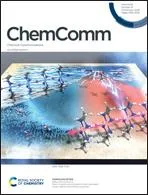The dilemma between acid and base catalysis in the synthesis of benzimidazole from o-phenylenediamine and carbon dioxide‡
文献情報
Martin Hulla, Simon Nussbaum, Alexy R. Bonnin, Paul J. Dyson
The tandem synthesis of benzimidazole and other azoles can be achived by the N-formylation of ortho-substituted anilines followed by a cyclization reaction. However, CO2-based N-formylations with hydrosilane reducing agents are base catalyzed whereas the cyclization reaction is acid catalyzed. The mismatch in catalytic conditions means that only one of the steps can be catalyzed in a single pot reaction. While the N-formylation reaction is frequently the target of catalyst development, the cyclization reaction requires comparably much harsher reaction conditions. Identification of these difficulties lead us to the development of a one-pot, two-step synthesis of benzimidazole under mild reaction conditions employing acid catalysts.
関連文献
IF 6.222
Building microsphere–nanosheet structures in N-doped carbon to improve its performance in the oxygen reduction reaction and vanadium redox flow batteriesIF 6.367
Visible light-driven cross-coupling reactions of alkyl halides with phenylacetylene derivatives for C(sp3)–C(sp) bond formation catalyzed by a B12 complexIF 6.222
Chemoproteomics-based target profiling of sinomenine reveals multiple protein regulators of inflammationIF 6.222
Synthesis of aviation fuel from bio-derived isophoroneIF 6.367
Life cycle assessment of power-to-gas with biogas as the carbon sourceIF 6.367
Contents listIF 6.222
Insights into the mechanism of photosynthetic H2 evolution catalyzed by a heptacoordinate cobalt complexIF 6.367
Synthesis and optical and electronic properties of one-dimensional sulfoxonium-based hybrid metal halide (CH3)3SOPbI3IF 6.222
Outstanding Reviewers for ChemComm in 2020IF 6.222
掲載誌
Chemical Communications

ChemComm publishes urgent research which is of outstanding significance and interest to experts in the field, while also appealing to the journal’s broad chemistry readership. Our communication format is ideally suited to short, urgent studies that are of such importance that they require accelerated publication. Our scope covers all topics in chemistry, and research at the interface of chemistry and other disciplines (such as materials science, nanoscience, physics, engineering and biology) where there is a significant novelty in the chemistry aspects. Major topic areas covered include: Analytical Chemistry Catalysis Chemical Biology and medicinal chemistry Computational Chemistry and Machine Learning Energy and sustainable chemistry Environmental Chemistry Green Chemistry Inorganic Chemistry Materials Chemistry Nanoscience Organic Chemistry Physical Chemistry Polymer Chemistry Supramolecular Chemistry
おすすめサプライヤー
 J ü ke Systemtechnik GmbH
J ü ke Systemtechnik GmbH 上海済梁金属材料有限公司
上海済梁金属材料有限公司 岐阜宝冶チタンニッケル製造有限责任公司
岐阜宝冶チタンニッケル製造有限责任公司 LGC株式会社
LGC株式会社 フランクGutjahrクロマトグラフ
フランクGutjahrクロマトグラフ 无锡開立達実業有限公司
无锡開立達実業有限公司 カールツァイス自動検査有限会社
カールツァイス自動検査有限会社 昂得生化科技(上海)有限公司
昂得生化科技(上海)有限公司 石家庄天越精細化学工業有限公司
石家庄天越精細化学工業有限公司 貴州デッサン精细化工
貴州デッサン精细化工













![500789-05-9 - (3R)-3-(2-Chlorophenyl)-3-({[(2-methyl-2-propanyl)oxy]carbonyl}amino)propanoic acid 500789-05-9 - (3R)-3-(2-Chlorophenyl)-3-({[(2-methyl-2-propanyl)oxy]carbonyl}amino)propanoic acid](/structs/500/500789-05-9-80b4.webp)
